
Ethnorema
Scope & Guideline
Advancing interdisciplinary approaches to cultural studies.
Introduction
Aims and Scopes
- Language Documentation and Description:
The journal emphasizes rigorous methodologies for documenting and analyzing languages, particularly those that are lesser-described or endangered, contributing significantly to the field of linguistics. - Sociolinguistic Perspectives:
Ethnorema explores the relationship between language and identity, speech communities, and social dynamics, offering insights into how language shapes and is shaped by cultural contexts. - Cultural Anthropology:
The journal integrates anthropological insights into its linguistic studies, examining cultural practices, traditions, and the socio-historical contexts of language use. - Historical Linguistics and Ethnolinguistics:
Ethnorema publishes research that connects linguistic analysis with historical and ethnographic perspectives, shedding light on the evolution of languages and their speakers. - Interdisciplinary Approaches:
The journal fosters interdisciplinary research by bridging linguistics, anthropology, history, and sociology, encouraging diverse methodologies and theoretical frameworks.
Trending and Emerging
- Reflexive and Meta-Documentation:
There is an increasing interest in reflexive approaches to language documentation, focusing on the methodologies used in fieldwork and the implications of these practices for understanding linguistic diversity. - Interactional Sociolinguistics:
Recent papers emphasize conversation analysis and interactional perspectives, highlighting how language is used in social contexts, particularly in lesser-described languages. - Digital Humanities and Language Technology:
The journal is beginning to engage more with digital tools and technologies for language documentation, such as treebanking and corpus linguistics, reflecting broader trends in the field. - Health Communication and Language:
Emerging themes related to health communication, particularly in the context of cultural narratives around HIV/AIDS, show a growing intersection between language studies and public health. - Community-Based Linguistic Research:
There is a notable trend towards community-based approaches in linguistic research, focusing on the needs and contexts of language speakers, which aligns with contemporary movements in participatory research.
Declining or Waning
- Colonial Historical Studies:
While the journal has published significant works on colonialism and its impacts, recent issues indicate a decreasing focus on these historical analyses, possibly in favor of contemporary sociolinguistic issues. - Traditional Lexicography:
Research centered around traditional lexicographic methods seems to be less prevalent, as the journal appears to be moving towards more innovative approaches to language documentation and digital archiving. - General Cultural Histories:
Papers focusing on broad cultural histories without specific linguistic ties are becoming less frequent, suggesting a trend towards more focused and language-centered studies. - Static Ethnolinguistic Studies:
There is a noticeable shift away from static ethnolinguistic studies that do not engage with contemporary issues or methodologies, indicating a preference for dynamic, interactional approaches. - Folk Theories and Mythologies:
Themes surrounding folklore and mythology are appearing less often, suggesting that the journal is prioritizing empirical research and practical applications in language studies.
Similar Journals
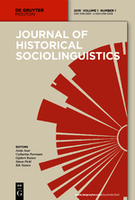
Journal of Historical Sociolinguistics
Bridging History and Sociolinguistics for Future InsightsThe Journal of Historical Sociolinguistics is a distinguished publication focusing on the intricate relationships between language and society from a historical perspective. Published by WALTER DE GRUYTER GMBH in Germany, this journal (ISSN: 2199-2894, E-ISSN: 2199-2908) is recognized for its rigorous scholarship, ranking in the Q2 quartile in Linguistics and Language (2023), highlighting its relevance and impact within the academic community. With Scopus rankings placing it at #326/1088 in Arts and Humanities and #386/1167 in Social Sciences, this journal is essential for researchers and scholars interested in the dynamics of language evolution, sociolinguistic shifts, and historical context. Through its insightful articles and contributions, the journal aims to illuminate the nuanced interplay between linguistic change and social factors over time, making it an invaluable resource for students, professionals, and academics alike. The journal operates under an open-access model, ensuring that knowledge is disseminated widely and freely accessible to those engaged in the cutting-edge studies of sociolinguistics.
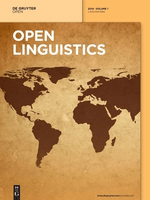
Open Linguistics
Exploring the depths of language research without barriers.Open Linguistics is a premier open access journal dedicated to advancing the field of linguistics, published by DE GRUYTER POLAND SP Z O O. Since its inception in 2014, the journal has consistently provided a platform for innovative research and critical discourse in various subfields of linguistics. With an impressive Q1 ranking in the linguistics category as of 2023, Open Linguistics is recognized for its significant contributions, ranking #223 out of 1088 in Arts and Humanities, as well as achieving a commendable #260 out of 1167 in Social Sciences. The journal's open access policy ensures that research is freely accessible to both scholars and practitioners, fostering a collaborative and inclusive academic community. With a focus on original research, reviews, and theoretical papers, Open Linguistics is positioned as an essential resource for researchers, educators, and students seeking to deepen their understanding of language and its diverse applications in society.
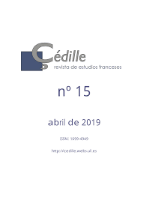
Cedille-Revista de Estudios Franceses
Unveiling the Intricacies of French Culture and LanguageCedille-Revista de Estudios Franceses is a prominent academic journal published by the ASOC PROFESORES FRANCES UNIV ESPANOLA-APFUE and has established itself as a vital resource in the fields of Linguistics and Language and Literature and Literary Theory. Since its inception in 2005, this Open Access journal has provided a platform for rigorous scholarly articles and critical studies focused on French studies, fostering both research and discussion among academics from around the globe. Originating from Santa Cruz de Tenerife, Spain, Cedille has garnered a respectable impact factor and ranks in the second quartile for Linguistics and Language and the first quartile for Literature and Literary Theory in 2023. With converged years from 2009 to 2024, the journal aims to advance understanding and appreciation of French literature and its linguistic intricacies, serving as a vital forum for researchers, professionals, and students committed to the exploration of French culture and language studies.

Cadernos de Estudos Linguisticos
Fostering collaboration in the realm of linguistic research.Cadernos de Estudos Linguisticos, published by UNIV ESTADUAL CAMPINAS, INST ESTUDOS LINGUAGEM, stands as a pivotal platform in the field of linguistic studies since its inception in 1978. With its commitment to Open Access, this journal fosters the dissemination of cutting-edge research, ensuring that knowledge is accessible to a global audience. This also enhances collaboration among researchers, professionals, and students dedicated to exploring the nuances of language. The journal proudly carries the ISSN 0102-5767 and E-ISSN 2447-0686, attesting to its uninterrupted quality and relevance in linguistic scholarship. By addressing various facets of language studies, including syntax, semantics, and sociolinguistics, this esteemed journal is a vital resource for advancing understanding and innovation in the field.
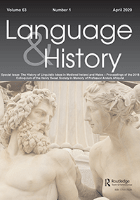
Language & History
Bridging Linguistics and History for Deeper InsightsLanguage & History is a distinguished journal published by Routledge Journals, Taylor & Francis Ltd, focusing on the intersection of linguistics and historical context. With an ISSN of 1759-7536 and an E-ISSN of 1759-7544, this journal serves as a vital platform for scholars exploring the dynamic relationship between language evolution and historical narratives. It is recognized for its contributions to the field, holding a Q2 ranking in Linguistics and Language for 2023, reflecting its esteemed position among peer publications. Indexed in Scopus with notable rankings in both Arts and Humanities and Social Sciences, Language & History aims to foster innovative research, shed light on language change, and encourage cross-disciplinary dialogue. The journal operates without open access, providing rigorous peer-reviewed content for researchers, professionals, and students alike, ensuring that cutting-edge studies remain at the forefront of linguistic research. Published biannually, it continues to attract a diverse array of contributions that enrich the understanding of language within historical contexts, making it an essential resource in the academic community.

Turkic Languages
Fostering Understanding of Turkic Languages WorldwideTurkic Languages is an esteemed academic journal published by HARRASSOWITZ VERLAG, dedicated to the exploration and analysis of Turkic languages within the broader fields of linguistics and language studies. With an ISSN of 1431-4983, this journal serves as a vital platform for researchers, professionals, and students interested in the intricate structures, dynamics, and cultural contexts of Turkic languages. Although it currently operates without an Open Access option, the journal's commitment to quality research is evident in its placement within the Q4 category of Linguistics and Language for 2023, alongside its Scopus rankings where it stands in the 30th and 26th percentiles for Language and Linguistics across Arts and Humanities and Social Sciences, respectively. The journal's scope encompasses a variety of linguistic phenomena, striving to foster a deeper understanding of Turkic languages and their significance in the global linguistic landscape. With converged years from 2017 to 2022, Turkic Languages continues to uphold its reputation as a crucial resource for advancing scholarship in this specialized field.

Signo y Sena-Revista del Instituto de Linguistica
Exploring the intricacies of language and communication.Signo y Sena-Revista del Instituto de Linguistica is an esteemed academic journal published by the University of Buenos Aires, focusing on the intricate field of linguistics. With an ISSN of 2314-2189, this journal serves as a vital platform for the dissemination of innovative research and interdisciplinary studies pertaining to language and communication. Having adopted an Open Access model since 2012, it ensures that cutting-edge research is accessible to a global audience, fostering collaboration and knowledge sharing among scholars and practitioners. Through its commitment to high-quality peer-reviewed content, Signo y Sena plays a significant role in advancing the linguistic research landscape, making it an essential resource for researchers, professionals, and students alike who are dedicated to exploring the complexities and nuances of language. Located in Buenos Aires, Argentina, the journal invites contributions that not only enhance theoretical frameworks but also provide practical insights into linguistic applications.
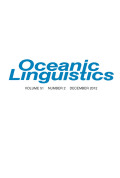
OCEANIC LINGUISTICS
Celebrating the Vibrancy of Pacific LinguisticsOCEANIC LINGUISTICS is a premier academic journal published by UNIV HAWAII PRESS, dedicated to the study of languages spoken in the Pacific region. This esteemed journal, bearing ISSN 0029-8115 and E-ISSN 1527-9421, serves as a vital platform for linguists, researchers, and scholars to disseminate significant findings and insights related to Oceania's rich linguistic diversity. With a commendable impact factor and categorized in the Q2 Quartile for the field of linguistics and language, OCEANIC LINGUISTICS ranks 335th out of 1088 in Arts and Humanities and 395th out of 1167 in Social Sciences, reflecting its relevance and influence in ongoing linguistic discourse. The journal is a subscription-based publication, committed to advancing research and fostering scholarly communication from 2004 to 2024, making it an essential resource for anyone engaged in the study of linguistic phenomena in the Oceania region and beyond.

Cadernos de Letras da UFF
Unveiling New Perspectives in Literature and LinguisticsCadernos de Letras da UFF is a prominent academic journal published by the Department of History at the Federal University of Fluminense in Brazil. Since its transition to Open Access in 2014, it has fostered a spirit of collaboration and dissemination in the field of Literature and Linguistics, welcoming contributions that explore various aspects of literary studies, historical literature contexts, and linguistic phenomena. With a commitment to quality and academic rigor, the journal serves as a vital resource for scholars, practitioners, and students engaged in the humanities. The journal is dedicated to the advancement of knowledge through innovative research and critical analyses, making it an essential platform for sharing ideas with a global audience. The journal is based in Niterói, RJ, Brazil, and is indexed in various academic databases, enhancing its visibility and impact within the scholarly community.
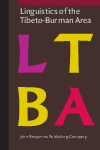
Linguistics of the Tibeto-Burman Area
Exploring the Rich Tapestry of Tibeto-Burman LinguisticsLinguistics of the Tibeto-Burman Area is a premier journal dedicated to the study and exploration of the Tibeto-Burman languages, offering a significant platform for researchers, scholars, and practitioners in the field of linguistics. Published by John Benjamins Publishing Co, this journal not only maintains rigorous scholarly standards but also aims to contribute to the understanding of language diversity and evolution within the Tibeto-Burman region. With an impressive Q2 ranking in linguistics and language, it ranks in the 49th percentile within Arts and Humanities and the 45th percentile in Social Sciences, highlighting its relevance and quality in the academic community. Since its inception in 2011, the journal has been at the forefront of disseminating research that encourages interdisciplinary dialogue and fosters insights into language structure, use, and cultural implications. Though not an open access publication, it remains accessible to institutions and individuals alike, ensuring that vital academic discussions continue. The ISSN for print is 0731-3500 and for the electronic version, 2214-5907, facilitating the work of the growing scholarly community engaged in Tibeto-Burman linguistics.